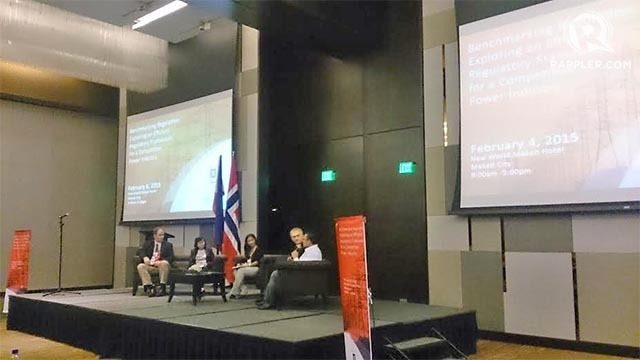SUMMARY
This is AI generated summarization, which may have errors. For context, always refer to the full article.

The looming power shortage in the summer of 2015 and the pending Senate approval to grant President Benigno Aquino III emergency powers to address it, are two of the pressing issues that concern the energy industry at this time.
Townsend noted that while building more power plants was explored as a solution to the anticipated power shortage, this is not feasible for now as the overstretched Energy Regulatory Commission (ERC) has hundreds of contracts that need to be addressed, some awaiting a decision for years.
Maximize electric cooperatives

Electric cooperatives, if maximized, can form part of the solution for stable and efficient power supply in the country, Townsend said.
He added that electric cooperatives account for about 23% of total energy consumption serving about 9 million customers, mostly households.
One way of increasing efficiency and lowering prices for electric cooperatives, within legal constraints, would be to create incentives that amount to demand aggregation.
The proposal is that each cooperative would have a unique optimal portfolio price that will be set for at least one to 3 years.
Customers served by electric cooperatives would only pay that benchmark rate and not have to pay for monthly adjustments.
The electric cooperatives’ administrators would then decide, after assessing risk, how to best provide kilowatt-hours to its customers through portfolio contracting to different power generators.
Because electric cooperatives are small, they have to aggregate their demand and group together to enter into cheaper contracts with a portfolio of generators based on higher volume, Townsend said.
He illustrated that this has resulted in some of the lowest priced contracts for power from newly built coal plants.
Create larger electric cooperatives
But achieving lower costs is not simply a matter of building more coal plants, Townsend said.
A more effective means is contracting a combination of plants using different energy sources able to meet requirement optimally during the course of the day as load varies.
Such system allows electric cooperatives to tap into capacity designed for other purposes, and allow them to build up capacity to meet total load using a variety of energy mixes.
But with the current 120 electric cooperatives, 20 investor-owned utilities and hundreds of complex generation and transmission contracts to regulate, the ERC has too much on its plate, Townsend said.
The energy specialist suggested that a way to simplify this is to regulate electric cooperatives based on categories or groups of distribution companies.
Creating even larger groups would be easier to regulate and create larger economies of scale, Townsend said.
Building larger cooperatives by merging existing ones is also an option, but Townsend said this could run into significant legal complications, prolonging the process.
Overall, a concrete action must be done now because if the next administration runs an election wherein power sector issues play a big part, the regulatory situation will be even more uncertain, Townsend emphasized. – Rappler.com
Add a comment
How does this make you feel?
There are no comments yet. Add your comment to start the conversation.